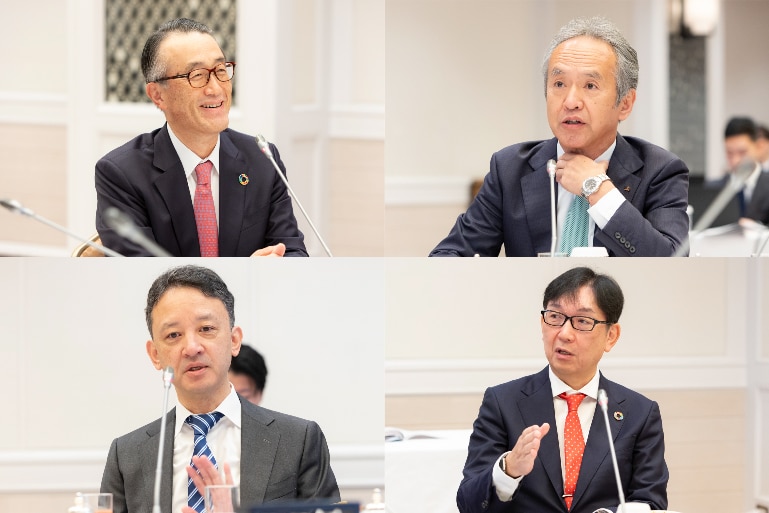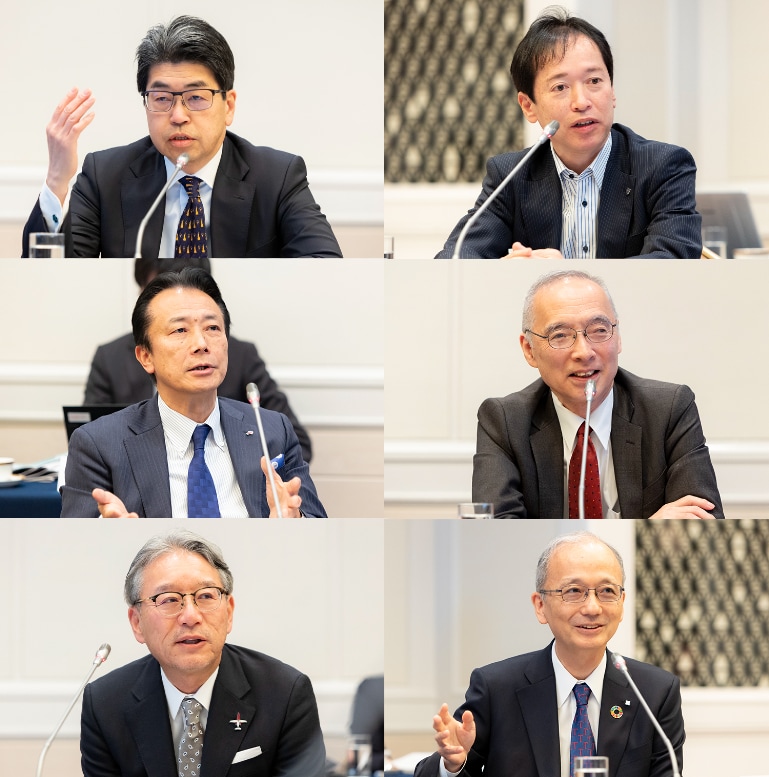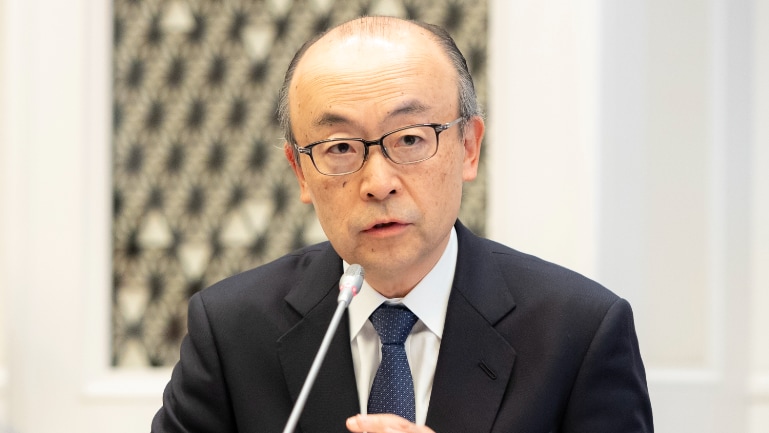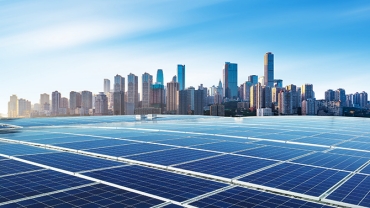
The Executive Sustainability Forum, an initiative first proposed by the PwC Japan Group, held its third meeting in Tokyo on 28 November and 5 December 2023. Executives from 13 Japanese companies dedicated to sustainability management participated in the meeting. They discussed the current state of the circular economy and future business models in Japan and the ASEAN region.

Kanetsugu Mike, Chairman of Mitsubishi UFJ Financial Group (top left), Seiji Izumisawa, President and CEO of Mitsubishi Heavy Industries (top right), Yukio Kani, Global CEO and Chair, JERA Co., Ltd. (bottom left) and Akimoto Uchikawa, President and CEO, Teijin Limited (bottom right)
The circular economy concept and case studies based on three perspectives
The meeting was spread over two dates, with two different groups of attendees on each day. Since the forum's last meeting in June 2023, PwC Japan visited Malaysia, Indonesia, Thailand and Singapore, to conduct fact-finding surveys. We engaged with around 50 companies and organisations discussing initiatives, issues and prospects concerning the circular economy. At the outset of the meeting, we gave an explanation of the circular economy framework advocated by PwC. In addition, we provided further insights into the latest circular business in the ASEAN region as compiled in our fact-finding survey.
The circular economy was defined as ‘seeking to minimise extraction and dispersal of resources and maximise reuse and recycling to achieve both solutions to environmental issues and economic growth’. Based on this definition, the meeting demonstrated the feasibility of approaches to balance circular business with economic viability being taken hand-in-hand by Japanese and ASEAN companies in material, carbon and bio-circularity.
In relation to material circularity, fostering recycling and industrial waste treatment industries involved in the reprocessing and resale of waste products is essential. However, the reality in the ASEAN region is that these industries are overwhelmingly operated by informal enterprises, that are not publicly registered, and it is therefore difficult to prepare a functional and formal infrastructure across the supply chain. One suggested method for addressing the issue is collaboration with local companies that can bring together these informal enterprises. As for the critical minerals, circularity within the region is extremely important, particularly from the perspective of geopolitical risks. In order to achieve this, it was suggested that collaborations with start-ups possessing recycling technologies would be an effective strategy. It was reported that some ASEAN companies expressed hope, stating 'long term and consistent transactions with local businesses by Japanese businesses will enable investment in local ventures.'
With regard to carbon circularity, global energy companies are looking for ways to restructure their portfolios towards decarbonisation. Japanese companies are also working to improve technology and accumulate their knowhow regarding carbon capture, utilisation and storage (CCUS), as well as the production of new energy sources, such as hydrogen and ammonia. However, currently, the social implementation of renewable energies and decarbonisation technologies is extremely costly, and the reality is that achieving high returns is not feasible. Nonetheless, one solution that was suggested is the collaboration with a local company simultaneously working on related ecosystems of mobility and recharging services, battery recycling as well as renewable energy. In addition, a strategy was presented in which Japanese companies take advantage of their strengths in each of the areas that ought to form that ecosystem, and gradually carve out related markets.
Regarding bio-circularity, the spotlight was focused on how to normalise the nitrogen cycle. While nitrogen is an essential element for living organisms, such as producing amino acids, nitrogen compounds, such as nitric acid, are water and soil pollutants. Excessive use of nitrogen fertilisers can lead to agricultural land depletion, insufficient crop supply, and the potential inability to provide enough food for future populations. "Regenerative industry" was raised as an important theme to address these issues. The “regenerative” is one that aims for “the recovery of the natural environment while improving the natural powers inherent in soil”. The players that would be involved in the regenerative approach are small, however, it is necessary to link and integrate their individual knowhow and resources to establish a large market. At this forum, it was also discussed that attention should be paid to the regenerative industry in order to further deepen the consideration of bio-circularity.

Nobumitsu Hayashi, Governor of Japan Bank for International Cooperation (top left), Toshiaki Sumino, President of The Dai-ichi Life Insurance Company (top right), Taro Fujie, President and CEO of Ajinomoto Co. (middle left), Mitsuru Ota, Deputy President, Development Bank of Japan (middle right), Toshihiro Mibe, President and CEO of Honda Motor Co. (bottom left) and Toru Takakura, President of Sumitomo Mitsui Trust Holdings (bottom right)
Insights from ASEAN company guest speakers for pursuing a circular economy
Several ASEAN companies relevant to the topic, were invited to attend the meeting online. A senior executive from a Singapore-based company, specialising in investments in circular economy start-ups, shared insights into their company's experience. They highlighted their circular economy fund's focus on advancing plastics supply chain in Asia, and their commitment to investing in disruptive innovation. These include business models enabling reuse, the development of innovative materials as alternatives to plastics, and advancement in recycling and biotechnology.
This senior executive also spoke about the state of a circular economy in Asia. They explained that there were notable movements in countries such as India, the Philippines and Thailand that have contributed to the establishment of sustainable plastic recycling supply chains. Moreover, they revealed that there is also mounting pressure in society for the construction of traceable and transparent supply chains. On the other hand, the gist of their analysis was that there is a significant need for capital to boost the development of a circular economy in Southeast Asia. Compared to the investment needed to create a basic waste management infrastructure in Southeast Asia, the annual private deal flow is significantly inadequate, and more capital is needed. According to them, the amount of capital required is in the billions (USD), but currently only a very small amount of capital is being spent on mainly early-stage start-ups. They also expressed hope that their fund could demonstrate that the Southeast Asian market is one worth investing in, and that the requisite funding would be obtained.
A senior executive from a Malaysian company specialising in plastic recycling emphasised the single most importance of traceability facilitated by digital technology. To enhance traceability, their company has partnered with another enterprise to develop a dedicated app and is optimising the collection process for recyclable items, collected by 28,000 mobile pickers who visit homes. The company has also achieved an approach through chemical recycling for creating base materials with excellent quality stability and a high degree of purity. He said that recyclability is improving thanks to the above series of initiatives.
An attendee from one of the participating companies inquired about the obstacles hindering the scaling up of the Malaysian company's business. Was it technology, human resources, the nature of regulations, or the degree of interest in or behaviour of the public? Did the amount of financing exert an influence? The response was that all of these are vital factors, on top of which it is also important to create strategic partnerships requisite for building circularity. While mentioning some initiatives with various partners, they said that their company could be a catalyst to make change happen.
In response to a question about how to collaborate with the government and municipalities, they responded given that the approach of the government is top-down, what they are considering now in Malaysia is bottom-up initiatives, recognising the importance of both. An example of the bottom-up approach was highlighted, citing the smart collection system in Malaysia in which each household actively participates. They explained that their strategy involves implementing initiatives at both the top-down and bottom-up levels, starting at the local level, then progressing to the state level and ideally, national level.
Even within the ASEAN region there is significant disparity between geography, climate, geology and business practices. While addressing these challenges, it is essential to develop actionable initiatives. Without such initiatives, Japan and the ASEAN countries may struggle to sustain their partnership in promoting the circular economy together. Some participating companies voiced the importance of deciding where to start and the sequence of actions. Furthermore, it is vital to display a winnable game plan and gain a solid consensus.

Koichiro Kimura, Chairman, PwC Japan Group
Joint statement announced aiming at the construction of an ecosystem
The forum believes that establishing a wider and stronger cooperative system between Japanese and ASEAN businesses can be achieved by communicating at international conferences, obtaining feedback and working together. During the meeting, there was a discussion on how the forum can effectively communicate globally and define its role in this context.
One of the participating companies voiced the opinion that Asia is the driver of world growth. They highlighted the importance of sending out a positive message while striking a balance between the development of a circular economy and economic growth. Others pointed out that Japan can make contributions in many fields with its technology and knowhow. They added that it is important to expand the circle in cooperation with local businesses, governments and citizens. There were also comments on the importance of ‘Japan playing a hub role in the circular economy’ and the need to listen to voices of Asian countries while exploring solutions together. In addition, it was suggested that there was a need to share ‘stories’ with ASEAN companies in order to promote technological development and maintain economic rationality.
Furthermore, there was a unanimous perception that the forum holds significant expectations as a platform for the exchange of information and opinions with ASEAN companies. Emphasising the importance of communicating initiatives through mutual collaboration, a broad consensus was reached to publish the Joint Statement on the Circular Economy and Carbon Neutrality. This statement, compiled based on previous discussions, was issued to coincide with the 2024 World Economic Forum Annual Meeting in Davos, Switzerland (published on 16 January 2024). Through this style of communication, we will continue to vitalise exchanges of information and opinions with ASEAN companies, and proceed with efforts to contribute to a circular economy ecosystem.
The Executive Sustainability Forum was launched in 2022 under the mutual understanding that countries must share the goal of sustainability and take measures that accommodate local circumstances to achieve sustainable growth in Asia, including Japan. The number of participant companies has expanded from the original 11 to 13 as of December 2023. The forum will continue to explore solutions for a sustainable world through discussions between the executives of companies spanning diverse industries. Additionally, it will also consider the unique circumstances facing Asian countries, which may differ from those in the West.
Our Team
Masataka Kubota
Territory Senior Partner, PwC Japan Group


